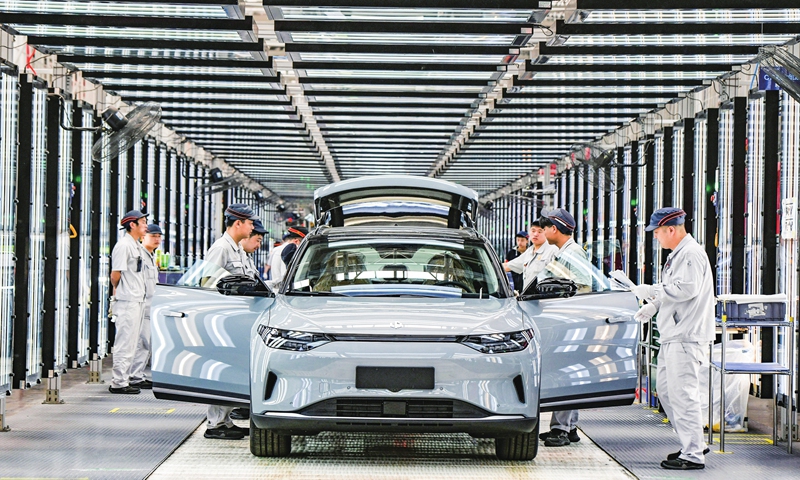(Source:Global Times,2024-06-25) Workers complete assembling an electric vehicle (EV) at China's EV start-up Leapmotor in Jinhua, East China's Zhejiang Province on April 1, 2024. Photo: VCG
China may take countermeasures while citing WTO rules to ask the EU scrap tariffs on Chinese electric vehicles (EV) during upcoming consultations, observers said on Tuesday, as Chinese officials reportedly will have talks with the European Commission (EC) in Brussels this week.
Cooperation benefits both while frictions serve neither China nor the EU. The EU should strengthen industrial and supply chain cooperation with China in EV and other sectors to create a bigger pie, which is the fundamental way to boost the bloc's economic growth as well as globalization, observers said.
The rapid rise of China's new industries has been in line with the global trend of technological revolution and green development, Chinese Premier Li Qiang said Tuesday at the opening plenary of the 15th Annual Meeting of the New Champions, also known as the Summer Davos, in Northeast China's coastal city of Dalian.
EVs, lithium batteries and photovoltaic products produced by Chinese companies have not only met domestic demand but also enriched the global market supply. This has alleviated global inflationary pressure and made a positive contribution to global efforts in addressing climate change, Li said, the Xinhua News Agency reported.
Li's comments came as China and the EU have just agreed to launch consultations on the anti-subsidy investigation into Chinese EVs.
The EC said it would host technical talks with Chinese officials in Brussels this week, Reuters reported on Monday. The EU side has emphasized that any negotiated outcome of the investigation must be effective in addressing the injurious subsidization, it said, citing a spokesperson with the EC.
The consultation will provide an opportunity for China and the EU to understand each other's bottom line, Jian Junbo, a deputy director of the Center for China-Europe Relations at Fudan University's Institute of International Studies, told the Global Times on Tuesday.
While the EC, the EU's executive body, stubbornly defends its politically-driven subsidy claim and tariffs, China may reveal its countermeasures during the upcoming talks while citing WTO rules to urge the EU cancel its tariff decision, Jian said. He said opposition to trade protectionism and measures to boost win-win cooperation may also be on the agenda.
This marks the first formal talk between China and the EU since the bloc threatened hefty tariffs on EVs imported from China.
New information obtained by the Global Times offered a detailed account of how the EC carried out its so-called anti-subsidy probe into Chinese EVs in an extraordinarily unfair and opaque manner, and completely disregarded the Chinese side's efforts to engage in friendly consultations. Ultimately, the information revealed that the EC is to blame for provoking a bruising trade row with China.
An easiest consensus for China and the EU to reach during the upcoming consultations is to attract Chinese EV companies to invest in the EU, which is a wise choice to avoid trade frictions while supporting the development of green economy in the continent, Yang Chengyu, an associate research fellow at the Institute of European Studies of the Chinese Academy of Social Sciences, told the Global Times on Tuesday.
Investment may be a main driver for China-EU economic and trade cooperation, but Europe needs to improve its policies, regulations and other aspects to build a stable and predictable business environment for Chinese enterprises, he said.
China has seen the rapid development in digital and green technologies and made technological and production capacity advantages in a variety of important sector. The EU needs cooperation with China to achieve its green and digital transition, according to Yang.
In the future, China-EU economic and trade relations will be featured by cooperation amid intense competition, Jian said, calling for the EU to strengthen industrial and supply chain cooperation with China rather than seek de-risking.
Take the EV industry for example. China may provide quality batteries and other component while the EU offer design or other component so that they jointly produce assembled cars. The two sides can create a bigger pie through mutually-dependent industrial chains and rational division of labor. This is a fundamental way to boost China-EU cooperation, Europe's economic growth as well as globalization, Jian said.
The Chinese Ministry of Commerce said on Friday that the EU bears full responsibility, as it continuously escalates trade frictions with China, which could trigger a trade war, in response to media reports of various industries in the EU expressing concerns about escalating trade tensions potentially prompting a trade war.
If the European side adheres to its wrong way, China could launch anti-dumping or anti-subsidy investigations into the EU or any other EU member country in line with WTO rules, Jiang Jiaxi, an expert in international trade and partner of Jingtian & Gongcheng Law Firm, told the Global Times.
Although the EU seems determined to take measures to raise the cost for Chinese EVs entering the EU, anti-subsidy is a process that costs time and efforts. As a result, it waits to see how will the case concludes, Jiang said.
Amid complex global economic situation and US' growing trade protectionism, it's especially important for China and the EU to carry out close cooperation, Jiang said.
Jian Junbo,“China set to cite WTO rules to ask EU to scrap tariffs in talks: experts”
发布时间:
2024-06-25
访问次数:
10
